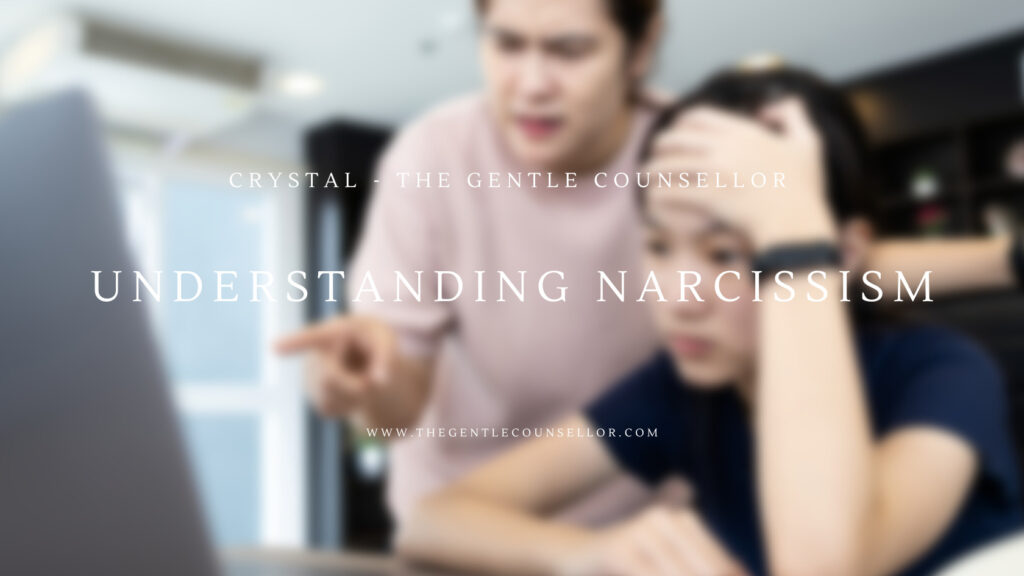
Understanding Narcissism:
Unveiling the Spectrum and Origins for Healing from Narcissistic Mother Relationships
Gain a comprehensive understanding of narcissism, its spectrum, and origins in the context of healing from narcissistic mother relationships. Explore the nuances of healthy self-esteem and narcissistic tendencies. Empowering women in Australia to break free and build healthier relationships.
In the journey towards healing from a narcissistic mother relationship, it is essential to gain a deep understanding of narcissism itself. This blog post aims to provide an in-depth exploration of narcissism, encompassing its spectrum ranging from lacking empathy to diagnosable narcissistic personality disorder (NPD). By differentiating healthy self-esteem from narcissistic tendencies and delving into the origins and potential causes of narcissism, I aim to empower women to navigate their healing journey armed with knowledge and clarity.
Defining Narcissism and its Spectrum:
Narcissism, at its core, is a personality trait characterised by an excessive focus on oneself, a grandiose sense of self-importance, and a constant need for admiration and attention. It exists on a spectrum, encompassing a range of individuals with varying levels of narcissistic traits. At one end of the spectrum with empathy, some individuals may lack empathy and exhibit mild narcissistic tendencies, while at the other extreme, some may meet the criteria for a diagnosable narcissistic personality disorder (NPD). Understanding this spectrum helps to comprehend the nuances and severity of narcissistic behaviours that may manifest within a mother-daughter relationship.
Differentiating Healthy Self-Esteem from Narcissistic Tendencies:
Healthy self-esteem forms the foundation of a balanced sense of self-worth and self-acceptance. It involves recognising and appreciating one's strengths, achievements, and inherent value. On the other hand, narcissistic tendencies often involve an exaggerated sense of self-importance, an excessive preoccupation with oneself, and a lack of empathy towards others. Differentiating between healthy self-esteem and narcissistic tendencies is crucial in identifying the presence of narcissistic behaviours within a mother-daughter dynamic. By understanding the distinctions, women can gain clarity about the impact of their mother's behavior on their own well-being.
Exploring the Origins of Narcissism:
Narcissism can have both genetic and environmental influences, with a complex interplay between nature and nurture. While some individuals may have a genetic predisposition towards narcissistic traits, environmental factors also significantly contribute to their development. Childhood experiences and early attachment relationships play a pivotal role in shaping narcissistic traits. For example, inconsistent or neglectful parenting, excessive praise without genuine validation, or overindulgence can contribute to the development of narcissistic tendencies. Additionally, family dynamics, such as a parent's own narcissistic traits or dysfunctional relationships, can impact the formation of narcissistic behaviors within an individual.
By exploring the origins of narcissism, women can gain insight into the complex factors that have shaped their mother's behaviour. This understanding can provide a sense of validation and help break the cycle of self-blame or guilt that often accompanies healing from a narcissistic mother relationship.
Conclusion:
Understanding narcissism is a vital step in the healing process for women seeking support from their narcissistic mother relationships in Australia. By comprehending the spectrum of narcissism, differentiating healthy self-esteem from narcissistic tendencies, and exploring the origins of narcissism, women can gain valuable insights into their own experiences and begin their journey towards healing. Armed with this knowledge, women can foster self-compassion, break free from the cycle of narcissistic abuse, and build healthier, more authentic relationships.
Book a Counselling Session with Crystal
Crystal provides individual and couple counselling. She specialises in Trauma, Attachment Theory, Perinatal Mental Health and Parenting Support. You can be supported in processing your trauma in a safe space to be seen and heard. Maybe you'd like to feel calmer and less triggered in your parenting, not worry so much about what others think of you, find more balance in meeting your own needs, figure out better communication skills, or just need someone to talk with who 'gets it'.